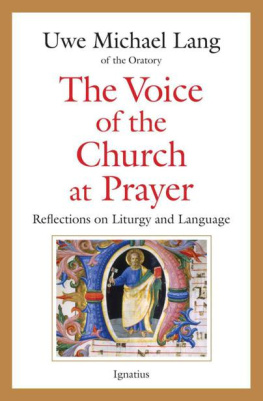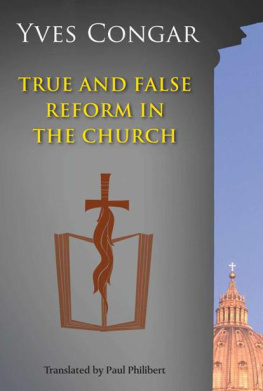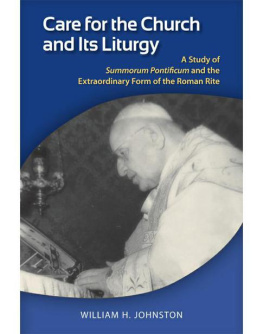Anglicans and the Roman Catholic Church
Anglicans and the
Roman Catholic Church
Reflections on Recent Developments
Edited by Stephen E. Cavanaugh
Decree of the Congregation for the Doctrine of the Faith
on the Pastoral Provision
1980 by Libreria Editrice Vaticana
Anglicanorum coetibus 2009 by Libreria Editrice Vaticana
Reprinted with permission
Cover design by Riz Boncan Marsella
2011 by Ignatius Press, San Francisco
All rights reserved
ISBN 978-1-58617-499-6
Library of Congress Control Number 2010937201
Printed in the United States of America
CONTENTS
Stephen E. Cavanaugh
Father Allan R. G. Hawkins
History
Father Jack D. Barker
Father Christopher G. Phillips
Father Peter J. Geldard
Juridical Status of the Anglican Use
C. David Burt
Father Aidan Nichols, OP
Stephen E. Cavanaugh
Bishop Peter J. Elliott
Anglican Difficulties
Father John Hunwicke, SSC
Linda Poindexter
Liturgy
Brother John-Bede Pauley, OSB
Professor Hans-Jrgen Feulner, Th.D.
PREFACE
Pope Benedict XVIs Anglican initiative embodied in the Apostolic Constitution Anglicanorum coetibus has caused some people to wonder, Where did that come from? The answer to that question lies in the experience of American and English Anglicans who have been the vanguard of seeking unity with the Holy See while retaining all that is good and noble in Anglicanism. With this volume, I seek to present the thought and experience of these Anglicans who, during the last thirty years, have sought closer communion with the Roman Catholic Church. Several of these essays were originally published in Anglican Embers , a journal that has been chronicling the historic developments between Catholic-leaning Anglicans and the Holy See. Some of the authors played a key role in the discussions that ultimately led to Pope Benedict XVIs Apostolic Constitution Anglicanorum coetibus . Others contributed to the ground-breaking efforts by recording their own experiences of entering the Roman Catholic Church.
The essays by Father Aidan Nichols, Father John Hunwicke, and David Burt, as well as my own, looked forward to a change in the legal status of the Anglican Use within the Catholic Church that was made possible by the 1980 Pastoral Provision of John Paul II. Because of both the possibilities and the limitations of that provision, much reflection was still needed and these essays pointed the way toward a fuller inclusion of the Anglican heritage within the Roman Church.
While the Pastoral Provision enabled parishes from the Episcopal Church to enter the Catholic Church corporately, retaining some elements of their liturgical heritage, the Pastoral Provision lacked hierarchical, liturgical, social, and spiritual elements needed to preserve the Anglican patrimony in the Catholic Church. Each Anglican Use parish, as one parish among many in its given diocese, had no official relationship with the other Anglican Use parishes. The Book of Divine Worship (BDW), even with all of the elements of Anglican piety and worship that it did preserve, was still a product of its time, the early 1980s, when the English translation of the liturgy in the Roman Rite was still in transition, and some of the rites in the BDW reflect that. With no way to train priests and deacons in the traditions of Anglican liturgy and spirituality, the outlook for preserving this patrimony within the Catholic Church looked as if it would not be able to last beyond the initial generation of Anglicans who entered into full communion. Pope Benedict XVIs Apostolic Constitution Anglicanorum coetibus addresses all of these shortcomings and extends this opening to Anglicans seeking communion with the Holy See to the entire world.
Given that there is still much work and prayer to be done in order to bring about the unity that the Lord intends for his Church, I have gathered these important essays in a single volume. It is my hope that Anglicans and Roman Catholics will continue to build upon the foundation that has already been laid.
Stephen E. Cavanaugh
Editor, Anglican Embers
December 23, 2010
INTRODUCTION
Father Allan R. G. Hawkins
Ecclesia Anglicana had flourished for perhaps thirteen hundred years before the events of the Reformation created what we now call Anglicanisma phenomenon that cannot be understood without reference to its ancient spiritual and cultural heritage, even though the separation of the Church of England from the rest of Western Christendom inevitably introduced a schismatic quality to even the best of Anglican thought.
The English Reformation, unlike the parallel movements elsewhere in Europe, was not a single, cataclysmic event, but rather a process that unfolded over more than a centuryfrom Henry VIIIs Act of Supremacy of 1534 to the reestablishment of the Church of England with the restoration of the Stuart monarchy in the person of King Charles II in 1660.
A striking feature of this process is the frequency with which the phrase until further order to be taken, or similar terminology, is to be found in the parliamentary enactments, legal documents, and Orders in Council of the period. In other words, each step of the reform was understood to be provisional , of temporary application, until further developments unfolded, until some ultimate denouement be attained.
In every subsequent century, that longed-for denouement has been seenby at least someto be the restoration of Catholic unity and peace for the Church. Thus Bishop Lancelot Andrewes, in his Preces Privatae , would pray each Sunday: O let the heart and soul of all believers again become one, and, each Monday, For the Universal Church, its confirmation and growth. For the Eastern Church, its deliverance and unity. For the Western Church, its restoration and pacification.
On the day of his appointment to Canterbury in 1633, Rome was ready to offer a cardinals hat to Archbishop William Laud. At the time of the restoration of the monarchy twenty-seven years later, Charles II appears to have sought the formation of a Uniate status for the Church of England. In the eighteenth century, there were some reunion activitiesnotably the correspondence between Archbishop Wake and certain doctors at the Sorbonne in Paris with regard to the possibility of union between the Anglican and Gallican churches. The nineteenth century brought the Oxford Movement, and all that stemmed from it. The twentieth century saw the Malines Conversations and then the inauguration, by the Archbishop of Canterbury, Michael Ramsey, and Pope Paul VI in 1967 of the AnglicanRoman Catholic International Commission (ARCIC).
Notwithstanding the early achievement of understanding in the long-controversial areas of Eucharist, ministry, and authority, the bright hope that the inauguration of ARCIC originally inspired quickly gave way to the bleak reality of the implications of the pressure for the ordination of womenfirst to the priesthood and then to the episcopatein the Church of England and elsewhere in the Anglican Communion. Pope John Paul II and Cardinal Jan Willebrands, then-president of the Council for Promoting Christian Unity, expressed to Archbishop Robert Runcie their profound concern that the course on which Anglicanism was embarkeddestroying, as it would, the integrity of its sacramental systemwould effectively put an end to the hope of reconciliation. Sometime later, Cardinal Walter Kasper said that the ordination of women to the episcopate signified a breaking away from apostolic tradition and a further obstacle for reconciliation between the Catholic Church and the Church of England. Sadly, indeed, Anglicanism chose to proceed on what has proved to be a self-destructive path, and to ignore the imperative of that unity which the Lord wills for his Church so that the world may believe.
Next page


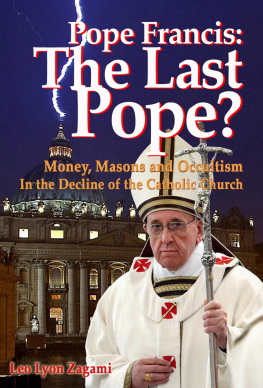

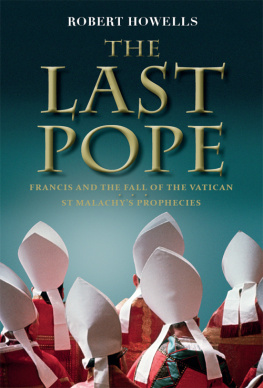
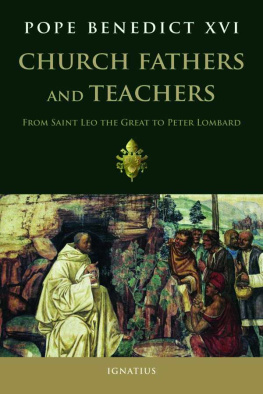
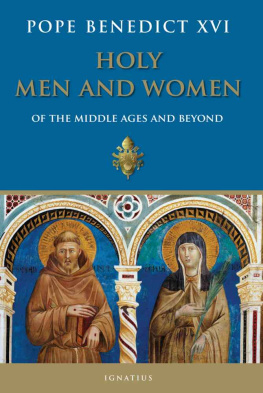
![Pope John XXIII - The Roman Missal [1962]](/uploads/posts/book/272720/thumbs/pope-john-xxiii-the-roman-missal-1962.jpg)
